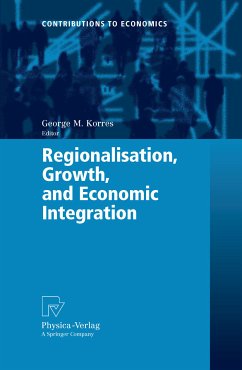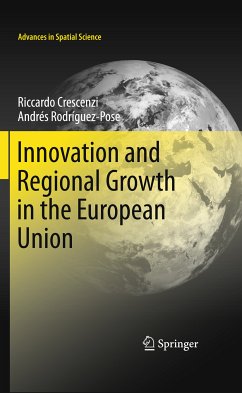
Regionalisation, Growth, and Economic Integration (eBook, PDF)
Versandkostenfrei!
Sofort per Download lieferbar
72,95 €
inkl. MwSt.
Weitere Ausgaben:

PAYBACK Punkte
36 °P sammeln!
Europe suffers from an inadequate capacity to transform scientific and technolo- cal knowledge into business opportunities [...] A strong collective effort will be needed in the area of innovation [...] To make any real impact on the unemployment problem and the future of forthcoming generations, macroeconomic policies must be backed up by an equally far-sighted range of microeconomic measures [...] This range of measures must above all include an extra special effort in the area of training of all types of human resources, of stepping up investment in - search and development and the developm...
Europe suffers from an inadequate capacity to transform scientific and technolo- cal knowledge into business opportunities [...] A strong collective effort will be needed in the area of innovation [...] To make any real impact on the unemployment problem and the future of forthcoming generations, macroeconomic policies must be backed up by an equally far-sighted range of microeconomic measures [...] This range of measures must above all include an extra special effort in the area of training of all types of human resources, of stepping up investment in - search and development and the development of an information society [...]. (Romano Prodi, Former President European Commission) There is considerable empirical evidence that investment in Research and Technological Development and Innovation (RTD&I) has a positive cor- lation with the level of economic development. Efforts in the area of RTD&I have been associated in the economic literature with higher growth rates, increases in exports and trade, gains in productivity, growth in income and output, bigger business profits and lower inflation, inter- tional competitiveness, etc. Innovation must apply to all aspects of the activity of a firm (markets, products, processes and services). In this sense, the concept of innovation embraces research and development, technology and training as well as marketing, design and quality, finance, logistics and not least the business management required to mesh these various functions together efficiently.
Dieser Download kann aus rechtlichen Gründen nur mit Rechnungsadresse in A, B, BG, CY, CZ, D, DK, EW, E, FIN, F, GR, HR, H, IRL, I, LT, L, LR, M, NL, PL, P, R, S, SLO, SK ausgeliefert werden.













